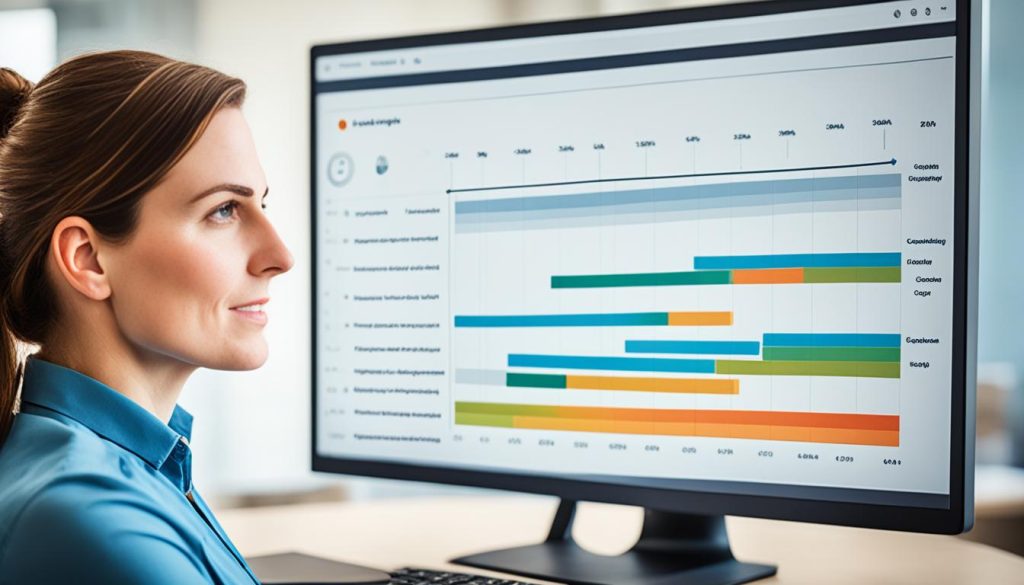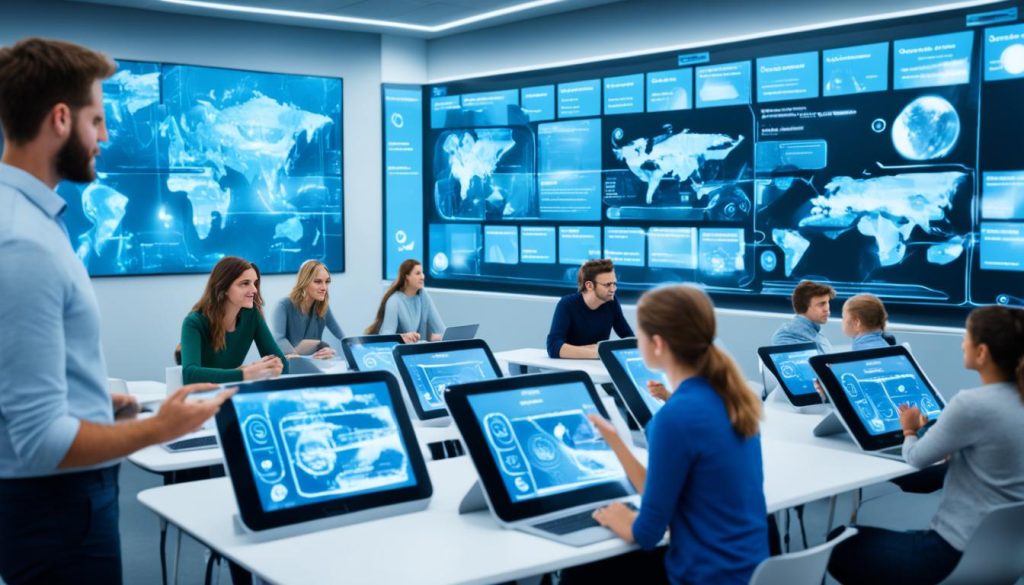The right knowledge for you as begin your journey to discover personalized education for learning
Welcome to an exciting new era of education, where personalized educational exploration is transforming the way we learn. Gone are the days of one-size-fits-all approaches, as tailor-made learning experiences take center stage. With customized learning pathways, every student has the opportunity to thrive and excel in their own unique way.
Personalized learning is all about empowering students by understanding their individual needs, abilities, and preferred learning modalities. It goes beyond the traditional classroom setting, providing options and materials that suit each student’s background and learning style.
As you embark on this journey of personalized education, you’ll discover the countless possibilities that lie ahead. Whether it’s through self-paced online courses or flexible classroom arrangements, personalized learning offers a world of opportunities for growth and success. And at the heart of it all is a powerful tool known as a Learning Management System (LMS), enabling teachers to develop customized materials, track progress, and provide support when needed.
Are you ready to unlock the true potential of your education? Let’s dive in and explore the world of personalized learning!
Key Takeaways:
- Personalized learning creates tailor-made learning experiences for each student.
- Customized learning pathways cater to students’ individual needs and preferences.
- A Learning Management System (LMS) is a crucial tool for successful personalized learning.
- Personalized learning offers flexibility through self-paced online coursework and flexible classroom arrangements.
- Teachers can track student progress and provide support using personalized approaches.
The Benefits of Personalized Learning
Personalized learning offers numerous benefits to both educators and learners. It provides learners with unique learning experiences that are tailored to their specific needs and interests. By giving students the opportunity to make choices and have autonomy in their learning, personalized learning enhances their motivation and engagement. Additionally, personalized learning allows for adaptability, as it adjusts to students’ progress and offers them the necessary support and challenges to facilitate their learning.
Through personalized learning, students are no longer confined to a one-size-fits-all approach. Instead, they can explore topics and concepts that resonate with their individual interests and passions. This customization fosters a deeper understanding of the content and promotes critical thinking and problem-solving skills.
“Personalized learning has allowed my students to truly take ownership of their education. They are more engaged and motivated than ever before, and their progress and growth reflect that.”
Furthermore, personalized learning empowers students to develop their own learning strategies and take responsibility for their education. By providing students with the autonomy to choose how and what they learn, they become active participants in their educational journey.
With personalized learning, students can work at their own pace, which allows for a more individualized approach to instruction. Students who need additional support can receive targeted interventions, while those who excel can dive deeper into advanced topics. This adaptive nature of personalized learning ensures that every student receives the appropriate level of challenge and support, promoting continuous growth and development.
Exploring Different Approaches to Personalized Learning
Personalized learning can be implemented through various approaches and strategies. Let’s take a closer look at three key methods: blended learning, competency-based learning, and self-directed learning.
1. Blended Learning
Blended learning combines both in-person instruction and online components, offering students the benefits of both traditional classroom settings and digital resources. This approach allows for a flexible and interactive learning experience, where students can engage with educational materials both in and out of the classroom. Blended learning promotes collaboration, self-paced learning, and the integration of technology tools to enhance the educational process.
2. Competency-Based Learning
Competency-based learning focuses on students mastering specific skills or knowledge before advancing to the next level. Instead of following a rigid timeline, learners progress based on their demonstrated understanding and proficiency. This approach ensures a deep and comprehensive grasp of the material, as students are required to meet predefined competency standards. Competency-based learning promotes personalized instruction, encourages self-assessment, and fosters critical thinking and problem-solving skills.
3. Self-Directed Learning
Self-directed learning empowers students to take control of their own education by allowing them to determine what, when, and how they learn. This approach encourages autonomy, curiosity, and responsibility, as learners actively engage in setting goals, planning their learning journey, and selecting resources and activities aligned with their interests and learning styles. Self-directed learning fosters independence, self-motivation, and lifelong learning skills.
By exploring these different approaches to personalized learning – blended learning, competency-based learning, and self-directed learning – educators can create diverse and tailored learning experiences that meet the unique needs and preferences of each student.

The Power of Adaptive Learning
Adaptive learning is a powerful and technology-driven approach that revolutionizes education by providing individualized instruction. It tailors the learning experience to meet the unique needs and progress of each learner, ensuring optimal engagement and mastery of concepts.
At the core of adaptive learning is the utilization of data-driven insights. By employing sophisticated data analytics, this approach gathers information about learners’ performance and adapts the learning content accordingly. Adaptive learning identifies the areas where students need improvement and customizes their learning paths, allowing them to focus on the specific knowledge and skills they require.
Through adaptive learning, students benefit from individualized instruction that caters to their specific learning styles, preferences, and pace. Personalized feedback and recommendations guide students towards better learning outcomes, fostering a deeper understanding of the subject matter.
Moreover, adaptive learning empowers educators with valuable insights to support their students’ progress. By tracking student performance and analyzing data patterns, teachers can make data-driven decisions regarding instructional strategies, interventions, and additional support.
“Adaptive learning allows educators to leverage data-driven insights, offering tailored instruction and empowering students to reach their full potential.”
The effectiveness of adaptive learning lies in its ability to ensure that every minute spent learning is efficient and impactful. By focusing on individual students’ specific needs, this approach maximizes their learning potential and accelerates their development.
Benefits of Adaptive Learning:
- Individualized instruction tailored to each student’s needs
- Efficient and effective learning process
- Improved learning outcomes and mastery of content
- Empowerment of educators with data-driven insights
- Enhanced student engagement and motivation
Adaptive learning represents a paradigm shift in education, harnessing the power of technology and data-driven insights to create a personalized and impactful learning experience. By embracing adaptive learning, educators and students can unlock their full potential and achieve educational success.
The Role of Technology in Personalized Learning
Technology plays a crucial role in enabling and enhancing personalized learning experiences. With the advancements in technology, educators now have access to powerful tools that can revolutionize the way students learn.
One of the key technologies that support personalized learning is Learning Management Systems (LMS). LMS provides educators with a comprehensive platform to create, organize, and deliver customized learning content to students. With LMS, educators can design personalized learning pathways, track student progress, and provide targeted support based on individual needs. This technology empowers teachers to cater to the unique learning styles and preferences of each student, ensuring a more engaging and effective learning experience.
In addition to LMS, digital learning tools are essential components of personalized learning. These tools encompass a wide range of applications, such as online courses, interactive platforms, and educational apps. Digital learning tools offer flexibility and accessibility, allowing learners of all ages to access educational resources anytime and anywhere. By leveraging these tools, students can engage in self-paced learning, explore interactive content, and collaborate with peers in virtual environments. This integration of technology not only enhances the learning process but also equips students with the digital skills necessary for success in the modern world.
Overall, technology in education has significantly transformed the landscape of personalized learning. It provides the platform and resources needed to create tailored learning experiences for students. The integration of Learning Management Systems and digital learning tools enables scalability and efficiency in personalized learning, allowing teachers to optimize their time and resources on supporting individual student growth and development.

Key Benefits of Technology in Personalized Learning
- Enhanced customization and adaptability
- Improved accessibility to educational resources
- Fosters learner engagement and motivation
- Enables collaborative and interactive learning experiences
- Efficient tracking of student progress and performance data
Overcoming Challenges in Personalized Learning
While personalized learning offers numerous benefits, it also presents some challenges. Developing individualized plans for each student can be time-consuming for teachers, requiring careful planning and organization. Building strong teacher-student relationships and trust is essential for successful personalized learning, as it involves understanding each student’s unique needs and preferences. Additionally, educational institutions may need to shift their traditional approaches towards supporting the iterative development of knowledge and embracing customization and adaptability.
The Challenge of Individualized Plans
Creating individualized plans for each student is a crucial aspect of personalized learning. However, it can be a daunting task for educators. It requires careful consideration of each student’s learning style, strengths, weaknesses, and goals. Teachers must allocate time to assess students’ needs and develop tailored strategies to address them. This process demands effective time management skills and the ability to balance the diverse needs of multiple students.
The Importance of Teacher-Student Relationships
In personalized learning, the teacher-student relationship plays a pivotal role in fostering a supportive and engaging learning environment. Building strong connections with students allows teachers to gain deeper insights into their unique needs, interests, and motivations. This understanding enables educators to customize their instruction, provide personalized feedback, and offer appropriate challenges. Cultivating trust and open communication is essential in creating an environment where students feel comfortable expressing their needs and seeking guidance.
Shifting Traditional Approaches in Educational Institutions
Implementing personalized learning may require a shift in mindset and practices within educational institutions. Traditional models often focus on a one-size-fits-all approach, where curriculum and instruction are standardized. Embracing personalization and adaptability requires a willingness to explore new teaching methods, technologies, and instructional resources. Schools and colleges need to provide professional development opportunities, resources, and support systems for educators to navigate the transition effectively.
| Challenges | Solutions |
|---|---|
| Time-consuming process of developing individualized plans for each student | Implement effective time management strategies and utilize technology tools to streamline the planning process. |
| Building strong teacher-student relationships and trust | Encourage open communication, provide mentorship opportunities, and foster a supportive learning environment. |
| Shifting traditional approaches in educational institutions | Offer professional development programs, provide resources, and create a culture of innovation and adaptability. |
Overcoming the challenges in personalized learning requires a collaborative effort from educators, students, and educational institutions. By recognizing the importance of individualized plans, nurturing strong teacher-student relationships, and embracing customization and adaptability, we can create a learning ecosystem that caters to the diverse needs of each student.
Unlocking the Potential of Personalized Learning
Personalized learning places a strong emphasis on knowledge construction rather than passive absorption. It acknowledges that learners develop their understanding through active exploration, iteration, and the connection of new information with their existing knowledge. By making learning meaningful and relevant to each individual, personalized learning enhances engagement and improves retention of knowledge. This approach fosters a more inclusive and effective learning experience where students can progress at their own pace and develop a deep understanding of the subject matter.
The Power of Knowledge Construction
Knowledge construction is a fundamental aspect of personalized learning. It involves learners actively engaging with the content, reflecting on their own experiences and opinions, and making connections between new information and what they already know. This process promotes critical thinking, problem-solving skills, and a deeper understanding of the material.
“Personalized learning allows students to construct their own knowledge by engaging with the content in a way that is relevant and meaningful to them.”
Meaningful Learning for Lasting Impact
Meaningful learning occurs when learners find personal relevance and value in the material they are studying. This type of learning goes beyond memorization and surface-level understanding, allowing students to make connections between concepts and apply their knowledge in real-world scenarios. When learning is meaningful, it becomes more engaging, enjoyable, and memorable.
“Meaningful learning occurs when learners see the purpose and value of the knowledge they are acquiring, leading to a deeper understanding and long-term retention.”
Improved Retention through Personal Connection
Personalized learning encourages learners to make personal connections with the content they are studying. When students can relate the material to their own experiences, interests, and goals, it becomes more meaningful and easier to remember. By focusing on individual needs and interests, personalized learning promotes improved retention and long-term knowledge acquisition.
“When learners make personal connections to the content, their retention and understanding are enhanced, leading to more successful and impactful learning experiences.”
| Traditional Learning | Personalized Learning |
|---|---|
| Passive absorption of information | Active knowledge construction |
| One-size-fits-all approach | Customized learning pathways |
| Low student engagement | High student engagement |
| Limited retention of knowledge | Improved retention of knowledge |
Conclusion
In conclusion, personalized learning offers a transformative approach to education, empowering educators to tailor learning experiences that meet the unique needs and abilities of each student. By leveraging technology, adaptive learning, and various teaching methodologies, personalized learning maximizes engagement, motivation, and learning outcomes.
One key takeaway from personalized learning is that it allows learners to take control of their education, fostering a lifelong love for learning. By customizing learning pathways and providing meaningful and relevant experiences, personalized learning creates a sense of ownership and autonomy in learners, enhancing their motivation to learn and explore.
As education continues to evolve, personalized learning will continue to play a vital role in unlocking the full potential of every learner. With its focus on individualization, customization, and adaptability, personalized learning has the power to transform the education landscape and create a more inclusive and effective learning experience. It is an approach that recognizes the unique strengths and abilities of each student and empowers them to thrive in a rapidly changing world.
FAQ
What is personalized learning?
Personalized learning is a teaching practice that allows educators to support students’ unique needs and abilities with customized learning pathways.
What are the benefits of personalized learning?
Personalized learning provides learners with unique and meaningful learning experiences tailored to their specific needs and interests. It enhances motivation, engagement, and adaptability, adjusting to students’ progress and offering necessary support and challenges.
What are the different approaches to personalized learning?
Some approaches to personalized learning include blended learning, which combines in-person instruction with online components, competency-based learning, which focuses on students mastering specific skills before moving on, and self-directed learning, which allows students to take control of their learning.
What is adaptive learning?
Adaptive learning is a technology-based approach that provides individualized instruction tailored to each learner’s needs and progress. It uses data analytics to adapt the learning content and provide personalized feedback and recommendations.
How does technology support personalized learning?
Technology plays a crucial role in enabling personalized learning experiences. Learning Management Systems (LMS) provide educators with tools to create and deliver customized learning materials. Digital learning tools, such as online courses and interactive platforms, offer flexibility and accessibility to learners of all ages.
What challenges are involved in personalized learning?
Developing individualized plans can be time-consuming, and strong teacher-student relationships and trust are essential. Educational institutions may need to shift their traditional approaches to support customization and adaptability.
How does personalized learning enhance knowledge construction?
Personalized learning recognizes that learners build their understanding through active exploration, iteration, and connections with prior knowledge. It makes learning meaningful and relevant, enhancing engagement and retention of knowledge.
What is the role of personalized learning in education?
Personalized learning offers a transformative approach to education, tailoring experiences to meet the unique needs and abilities of each student. It maximizes engagement, motivation, and learning outcomes, empowering learners to take control of their education.
